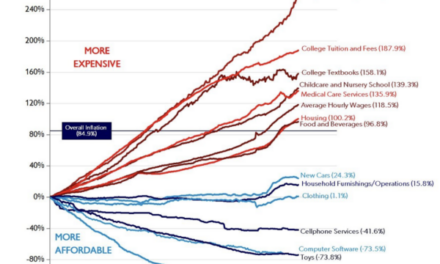We support our Publishers and Content Creators. You can view this story on their website by CLICKING HERE.
As if driven by a law of nature, government spending at every level has gone up and up, for decades. We are now facing a fiscal crisis: profligate government spending cannot go on, let alone continue to increase by leaps and bounds.
Pretty much everyone agrees with that proposition, but that doesn’t necessarily mean that voters are ready to start cutting. One should always bear in mind that basically, all government can do is write checks. If government, at any level, spends a billion dollars, that means that a billion dollars have been dispensed to someone–someone who would like to get more. If you spend a billion dollars–let alone trillions!–you can buy a lot of votes. Because someone is cashing every one of those checks, and becoming ever more dependent on them.
This is why many are skeptical as to whether the diffused interest in less spending and lower taxes, which is the self-interest of most of the population, will ever overcome the focused lobbying of the minority who are cashing the checks. Moreover, the Democrats’ great project of recent years has been to turn that minority of government dependents into a majority, so that it will never be possible to mount serious opposition to the growth of government.
So this is a crucial time to ask what Americans think about government spending. Rasmussen posed this question:
Speaker of the House Mike Johnson has vowed the new Congress will “drastically cut back the size and scope of government” and “create a leaner, faster and more vigorous federal workforce.” Do you approve or disapprove of cutting back the size of the federal government?
The question is flawed because it starts with “drastically cut[ting] back the size and scope of government,” detours via a “leaner, faster” workforce, and ends with a question about “cutting back the size of the federal government,” which is quite different from “drastically cut[ting] back.” It isn’t clear which formula voters were responding to.
So take it for what it is worth. But Rasmussen found broad support for spending cuts:
61% of Likely U.S. Voters approve of cutting back the size of the federal government, including 37% who Strongly Approve. Twenty-nine percent (29%) disapprove, including 15% who Strongly Disapprove, while another 10% are not sure.
61% is a solid majority, and the 29% who don’t want government spending cut are a pretty pathetic minority. That result is consistent with the widespread enthusiasm we have seen for the Department of Government Efficiency.
These results are also consistent with polling American Experiment has done in Minnesota. We haven’t asked whether voters want to cut back, or drastically cut back, state government spending. Rather, we have asked what percentage of state government spending respondents think is wasted. The median respondent thinks that more than 30% of all state government spending is wasted. That implies a willingness to support “drastic” spending cuts at the state level.
Democrats have long believed, smugly, that voters will never support meaningful budget cuts, because too many are on the take, and the ones who are on the take care a lot more than the larger number who are paying the taxes. At some point, though, as spending grows higher and higher, that calculus could shift. There are signs in the polling, including Rasmussen’s latest, that a majority is now ready for, or eagerly demanding, substantial budget cuts, not just a mild slowing in the rate of increase, as we have usually seen in the past.

 Conservative
Conservative  Search
Search Trending
Trending Current News
Current News 




